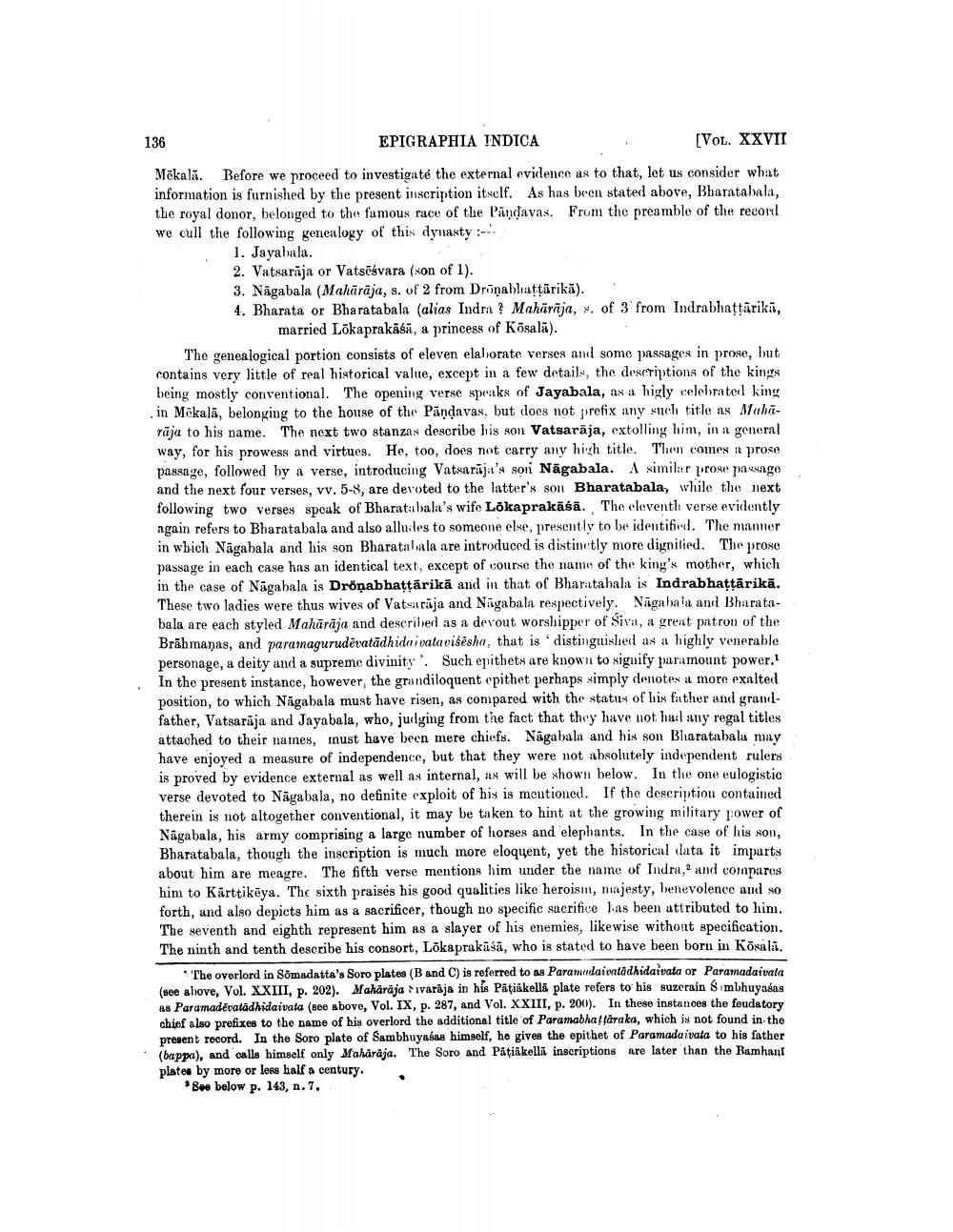________________
136
EPIGRAPHIA INDICA
[VOL. XXVII
Mēkalā. Before we proceed to investigate the external evidence as to that, let us consider what information is furnished by the present inscription itself. As has been stated above, Bharatabala, the royal donor, belonged to the famous race of the Pandavas. From the preamble of the record we cull the following genealogy of this dynasty
1. Jayabala 2. Vatsarīja or Vatsēśvara (xon of ). 3. Nāgabala (Mahārāja, s. of 2 from Drūņablattārikā). 4. Bharata or Bharatabala (alias Indra? Mahārāja, . of 3 from Indrabhattarika,
married Lõkaprakāśā, a princess of Kõsalā). The genealogical portion consists of eleven elaborate verses and some passages in prose, but contains very little of real historical value, except in a few details, the descriptions of the kings being mostly conventional. The opening verse speaks of Jayabala, as a higly celebrate king in Mökalā, belonging to the house of the Pandavas, but does not prefix any such title as Mahürāja to his name. The next two stanzas describe his son Vatsaräja, extolling him, in a general way, for his prowess and virtues. He, too, does not carry any high title. Then comes a prose passage, followed by a verse, introducing Vatsarāja's soni Nāgabala. A similar prose pasage and the next four verses, vv. 5-8, are devoted to the latter's son Bharatabala, while the next following two verses speak of Bharatabala's wife Lokaprakāśā. The cloventh verse evidently again refers to Bharatabala and also allu-les to someone else, presently to be identified. The manner in wbich Nāgabala and his son Bharatalala are introduced is distinctly more dignified. The prose passage in each case has an identical text, except of course the name of the king's mother, which in the case of Nāgabala is Drönabhattārikā and in that of Bharatabala is Indrabhattārikā. These two ladies were thus wives of Vatsa räja and Nagabala respectively. Nāgabala and Bharatabala are each styled Mahärāja and described as a devout worshipper of Siva, a great patron of the Brāhmaṇas, and paramagurudevatādhidai vatavišesha, that is distinguished as a highly venerable personage, a deity and a supreme divinity'. Such epithets are known to siguify paramount power. In the present instance, however, the grandiloquent cpithet perhaps simply denotes a more exalted! position, to which Nāgabala must have risen, as compared with the status of his father and grandfather, Vatsarāja and Jayabala, who, judging from the fact that they have not haul any regal titles attached to their names, must have been mere chiefs. Nāgabala and his son Bharatabala may have enjoyed a measure of independence, but that they were not absolutely independent rulers is proved by evidence external as well as internal, as will be shown below. In the one eulogistic verse devoted to Nāgabala, no definite exploit of his is mentioned. If the description contained therein is not altogether conventional, it may be taken to hint at the growing military power of Nägabala, his army comprising a large number of horses and elephants. In the case of his son, Bharatabala, though the inscription is much more eloquent, yet the historical data it imparts about him are meagre. The fifth verse mentions him under the name of Indra, and compares him to Kärttikēya. The sixth praises his good qualities like heroism, majesty, benevolence and so forth, and also depicts him as a sacrificer, though no specific sacrifice has been attributed to him. The seventh and eighth represent him as a slayer of his enemies, likewise without specification. The ninth and tenth describe his consort, Lõkaprakasā, who is stated to have been born in Kösali.
The overlord in Somadatta's Soro plates (B and C) is referred to as Paramurdaivatadhidaivata or Paramadaivata (see above, Vol. XXIII, p. 202). Maharaja Sivaraja in his Pāțiákellä plate refers to his suzerain Simbhuyasas as Paramadevatadhidaivata (se above, Vol. IX, p. 287, and Vol. XXIII, p. 200). In these instances the feudatory chief also prefixes to the name of his overlord the additional title of Paramabhaffaraka, which is not found in the present record. In the Soro plate of Sambhuyasas himself, he gives the epithet of Paramadaivata to his father (bappa), and calls himself only Maharaja. The Soro and Pätiäkella inscriptions are later than the Bamhani plates by more or less half a century.
Bee below p. 143, n. 7.




